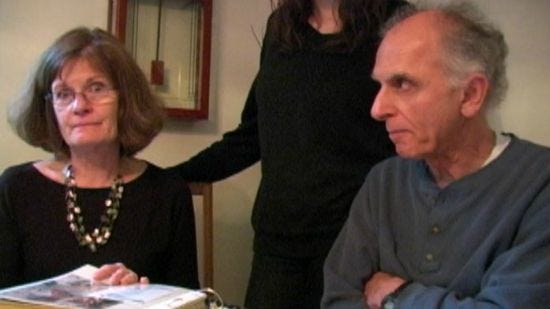Peanut Gallery

Molly Gandour, a young documentary filmmaker who was a producer of "Gasland," turns the camera on herself and her family for the feature "Peanut Gallery." If this seems like narcissism, it's not. Much like "Stories We Tell" from Sarah Polley a few years back, Gandour uses the filmmaking process as a method of self-discovery about the secrets of her family's past, and how they still weigh deeply on their interactions today.
The film is both exploratory and, literally, therapy: she and her mom and dad undergo counseling during the six weeks of her return to Lafayette, Ind., and we get to peek in on those sessions. But the bulk of the movie is unrehearsed conversations with her family, over dinner or even driving in the car, as well as a deep dive into the journals and videotapes that the smart and self-aware members of the Gandour clan kept.
Gandour actually shot the film in 2010 but, as she describes in the epilogue, it took her more than two years to even bear to look at the footage. She was, she said, mortified by her own detached disposition and the often cold way she regarded her parents. (Her mother devolves into tears more times than I could count.)
But she labored on to assemble the disparate pieces into this film, and we are better for it with this distinctly Hoosier tale of what happens to people in the years following a major trauma.
That was the death of Molly's older sister Aimee at the age of 14 to leukemia. Aimee's first bout with the deadly form of cancer came when Molly was just 2, and with her two relapses the older sibling's battle with cancer essentially encompassed her entire young life. ("Why do we always someone 'battles' cancer?" she asks in her narration. "They never just 'have' cancer.")
At the time, their friends and neighbors praised the Gandours for carrying on with grace after Aimee's passing. But Molly admits that now feels to her like missing pieces in her history, blank spaces that she's determined to fill in the gaps.
Her father, Jackson, is a linguistics professor at Purdue University who has buried his grief in his work to such an extent that it often seems like he has no emotional connection to those tragic events at all. Many of Molly's early interviews with her dad are while is seemingly preoccupied, nonchalantly eating or drinking on camera right before or after some confessional session. But the man, for all his modern liberal beliefs, is an old-school adherent to the notion that real men handle their emotions, and are not handled by them.
Her mother is a scientist in her own right, a clinical psychologist, who nonetheless often seems completely mystified by this grown woman that her daughter has become. Their interactions are heartrending and authentic, with the classic Midwestern reserve of people who were raised believing the worst social faux pas you can commit is to make a spectacle of yourself.
Slowly, painstakingly, Molly reconstructs her missing memories using those of her parents and Aimee's journals and the extensive library of home movies. A portrait of Aimee emerges, not just a victim but determined young woman who made plans for a life after leukemia, until she didn't anymore.
Molly, for her turn, comes to grips with the realization that her own development into womanhood was stunted not by her parents demanding too much of the "good" child, but her own feelings of inadequacy and alienation from a maturation process that was denied to the person most dear to her.
"I didn't want to be where she'd never been. I didn't want to do things she'd never done," she admits.
Part confessional, part research project, part therapy, "Peanut Gallery" shows how it's possible to burrow into the collective psyche of one normal family and find monumental seismic activity underneath the placid calm shown to everyday eyes. Even in wholesome Indiana, we ride the wave of dark rumbles wherever we may go.
PEANUT GALLERY - Trailer from Molly Gandour on Vimeo.

